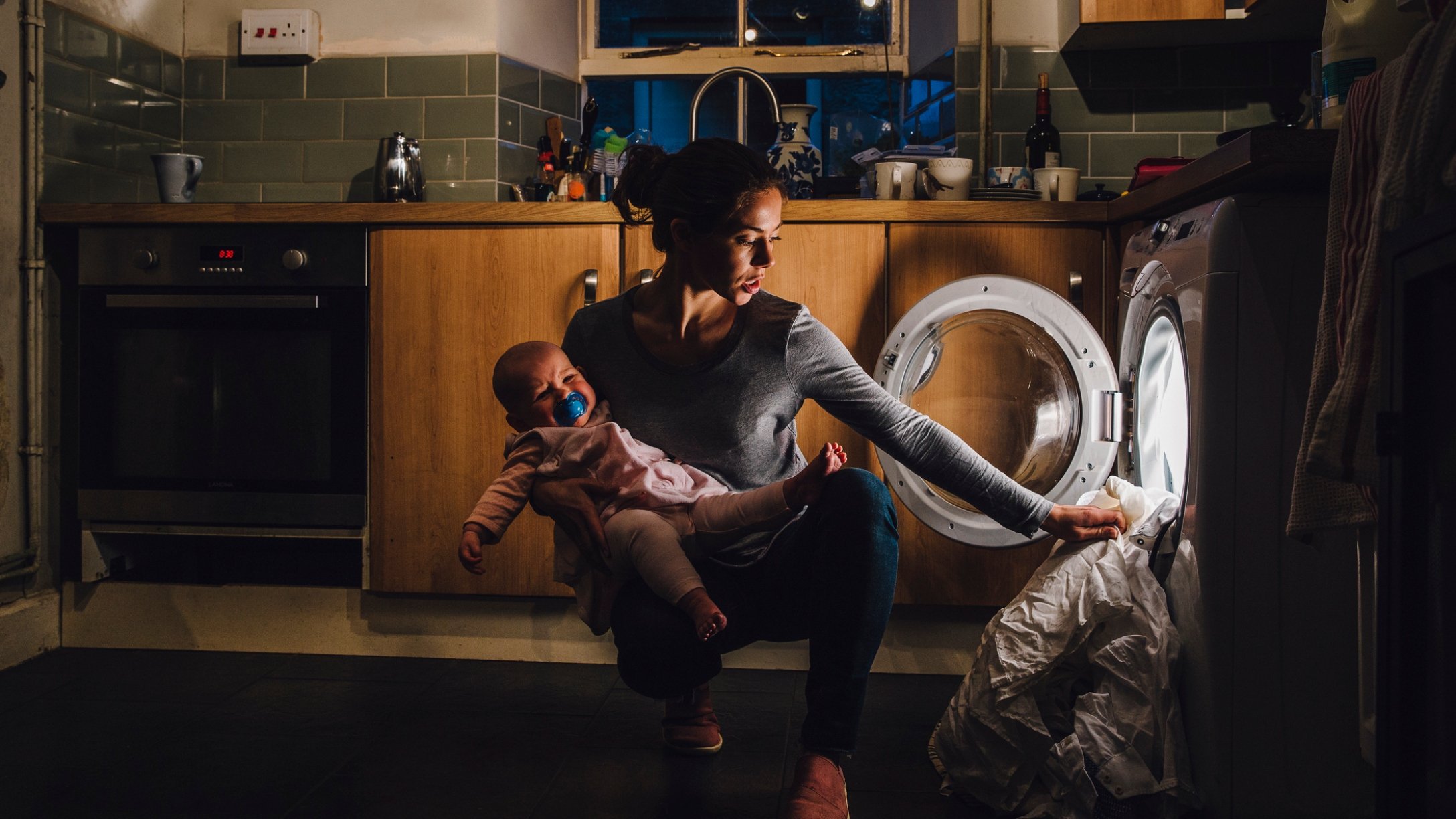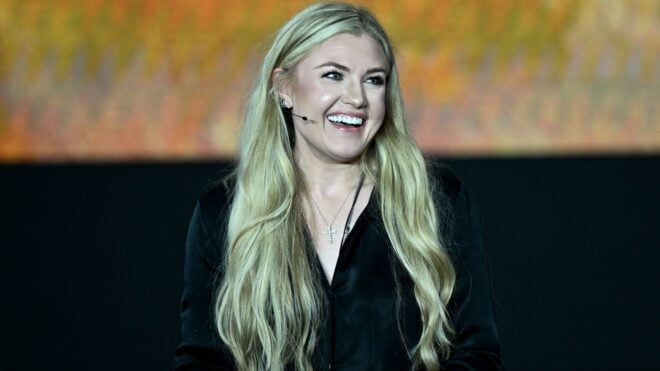
If you've been hearing a lot of talk about being the "default parent" lately, it's not just in your head. The controversial buzz word has once again been trending on TikTok, with more moms opening up about the burnout they're experiencing as the first-in-line person for all things kid-related.
But now it's more than just moms venting on TikTok — a licensed therapist has also joined the conversation, confirming that "Default Parent Syndrome" is not only real but a legitimate issue for moms all over the world.
The "default parent" discussion is actually nothing new
Moms have been talking about the topic for the past 10 or so years now, though the first mention of it might have come in this 2014 essay on HuffPost, which illustrated the phenomenon perfectly.
"Are you the default parent?" asked the mother and blogger M. Blazoned. "If you have to think about it, you're not. You'd know. Trust me. The default parent is the one responsible for the emotional, physical, and logistical needs of the children. Spoiler alert: It's typically the one with the uterus."
I’m the default parent, which means 95% of sick days I’m on duty and I manage all kid logistics. My spouse does bath and the dishes every night. I used to feel guilty, but I’ve come to value my labor, even if it’s not easy to see in the daily routine.#InvisibleLabor #FairPlay
— Rev. Skadi, godess of righteouss anger (@BlairTStowe) January 8, 2023
"Default parents know the names of their kids' teachers, all of them," she went on. "They fill out endless forms, including the 20-page legal document necessary to play a sport at school, requiring a blood oath not to sue when your kids gets concussions, because they are going to get concussions. They listen to long, boring, intricate stories about gym games that make no sense. They spell words, constantly. They know how much wrapping paper there is in the house. The default parent doesn't have her own calendar, but one with everyone's events on it that makes her head hurt when she looks at it. They know a notary. They buy poster board in 10-packs. They've worked tirelessly to form a bond with the school receptionists. They know their kids' sizes, including shoes, dammit."
Every few years, the conversation seems to pop up again
For a while, it came in the form of confessional essays and YouTube vlogs. But since the dawn of TikTok, moms have been letting loose about it in a much bigger way, and they've managed to form a sense of camaraderie in their shared misery.
@reneereina_ Let’s get into it this week. #momtok #momsoftiktok #relatable #relatablemom #honestmom #divisionoflabor #defaultparent ♬ original sound – Shannon
Often, the videos are raw, honest, and even a bit hilarious.
@diaryofanhonestmom I guess it was in the small print #motherhood #momlife #momsgetit #Mentalload #defaultparent #invisibleload #mamasupport #supportmoms #momsoftiktok ♬ Sweet Giirrrrllll face beat x Father Philis – Phil
But most of the time, they're just kind of sad and exhausting — even if they are highly relatable.
@mummy.of.four So what does it mean to be the default parent? #fyp #foryoupage #mummyofour #cleantok #cleanwithme #cleaningtiktok #motivationcleaning #defaultparent #mumlife #mumsoftiktok #adayinmylife #sahm #mumtok #singleparent #mumof4 #myroutine #mumclub ♬ original sound – LOTTIE
As a result, they've reignited an emotional conversation about the mental load of motherhood and the question of whether parenting can ever really be 50/50 — even in 2023.
@holtfam16 My husband really is the best and things could be so much harder, but it just hurts that it appears I wasn’t thought of #defaultparent #makemetakebreaks #WeStickTogether #momlife #sahmlife #mentalloadofmotherhood #parentsoftiktok ♬ original sound – Just_a_mom & her hobby
Now some experts appear to have entered the chat
In a recent essay for Psychology Today, Amber Thornton, Psy.D, of The Balanced Working Mama, wrote that Default Parent Syndrome isn't just a TikTok trend, but rather "a systemic and collective experience in which there is a bias toward women …."
"This bias is largely the product of decades of patriarchal cultural history that has continued to evolve in various ways throughout our time," Thornton added.
In other words, it's pretty hard to outrun, no matter how hard we may try.
This isn't meant to throw dads under the bus completely
To be fair, a growing body of research shows that dads are more involved in child-rearing than they used to be. Last year, a team of sociologists at Brigham Young and Ball State universities found that modern dads are actually more engaged with their kids than fathers of previous generations, which can have long-lasting impacts.
“We found that today’s dads spend more time, provide more care, and are more loving toward their kids than ever before,” study co-author Kevin Shafer, a BYU sociology professor, said at the time. “Most dads see themselves as playing an equally important role in helping their children as mothers do."
Still, that wasn't the case across the board.
"At the same time … there is a group of dads who believe they are to be breadwinners, disciplinarians, and nothing more," Shafer added.
Another survey, conducted in 2019 by a group called Men-Care, found that 85% of dads said they would "do anything" to be more involved with their kids on a day-to-day basis. That said, they still take on far less than moms do, showing that a significant gap still remains.
Like it or not, the scales are often tipped in the mother's favor
According to Thornton, this can happen for a variety of reasons — some within our control, and others not.
"In my work with women and mothers, I’ve noticed that there are certain qualities, characteristics, and circumstances that may place someone more at-risk for experiencing the Default Parent Syndrome," Thornton wrote.
In some cases, she says it happens because the relationship itself is built around traditional gender norms, or because the male partner grew up seeing his own mother as the one solely responsible for child-rearing.
Other times, it's about the mother's own psychological makeup.
For example, Thornton has found that women who struggle with things like perfectionism, people-pleasing, anxiety, and communication are more likely to take on the role of the default parent — regardless if they intend to.
The fallout of this can be pretty intense
According to Thornton, default parents often experience chronic fatigue and burnout, feelings of resentment toward their partner and/or their children, a significant decline in their mental health, and even an inability to properly care for themselves.
One dad on TikTok recently opened up about the topic after becoming a stay-at-home dad himself and realizing for the first time just how much mothers take on.
@owen_squires Facts. #stayathomemom #stayathomedad #dadlife #mytruth ♬ Queens of TikTok – Owen Squires
"Women deserve more respect and credit from men, particularly mothers," TikTok user @owen_squires said in a video that later went viral. "I thought I knew what stress and burnout was … I had no [expletive] idea."
"To care for your children every waking moment of every day, and to be the default parent that they come to for everything, is the most mentally exhausting thing that I have ever experienced in my entire life — hands down," he continued. "And I’m going to say it: 99% of men have no [expletive] idea what that’s like. I didn’t."
“We believe in the idea that my wife or any woman should not be the default parent, automatically the default caregiver.” –@RepJimmyGomez, whose wife is @themaryhodge, deputy mayor of LA https://t.co/X7PHpsibAW
— Samantha Ettus (@samanthaettus) January 7, 2023
And just last week, Rep. Jimmy Gomez (D-Calif.) stood before Congress with his 4-month-old baby strapped to his chest, in an effort to "normalize dads taking their kids with them."
“When I took him to the floor, I think people were surprised — but it wasn’t a big deal," Gomez later shared. "I think it does send a powerful message that us guys need to do our part. We don’t risk our lives bringing children into the world — women do."
Even if it is somewhat inevitable, there are still ways to make it better
In fact, Thornton details five clear steps every couple can take toward healing the wounds created by the default parent/backup parent dynamic.
First, acknowledge that it exists.
"We can only dismantle what we acknowledge exists," Thornton said. This will require a real, honest, and ongoing conversation with your partner about this syndrome showing up in your family and how it feels for you."
Next, identify the role this plays in your everyday lives.
"Once both you and your partner are on board about the Default Parent Syndrome being something that does exist within the home, it’s time to really identify how it manifests or shows up," she continues. "This means really understanding and communicating the ways in which one parent may be carrying more of the load and the effects of this for everyone involved."
Thornton also suggests making a shared vision board for the home to get on the same page about what you want for your family's future. However, with that comes setting real, achievable goals for how you can “undo” the dynamic that's been created.
Finally, Thornton says that monitoring the situation going forward — including any progress that's made or backsliding that might happen — is key.




